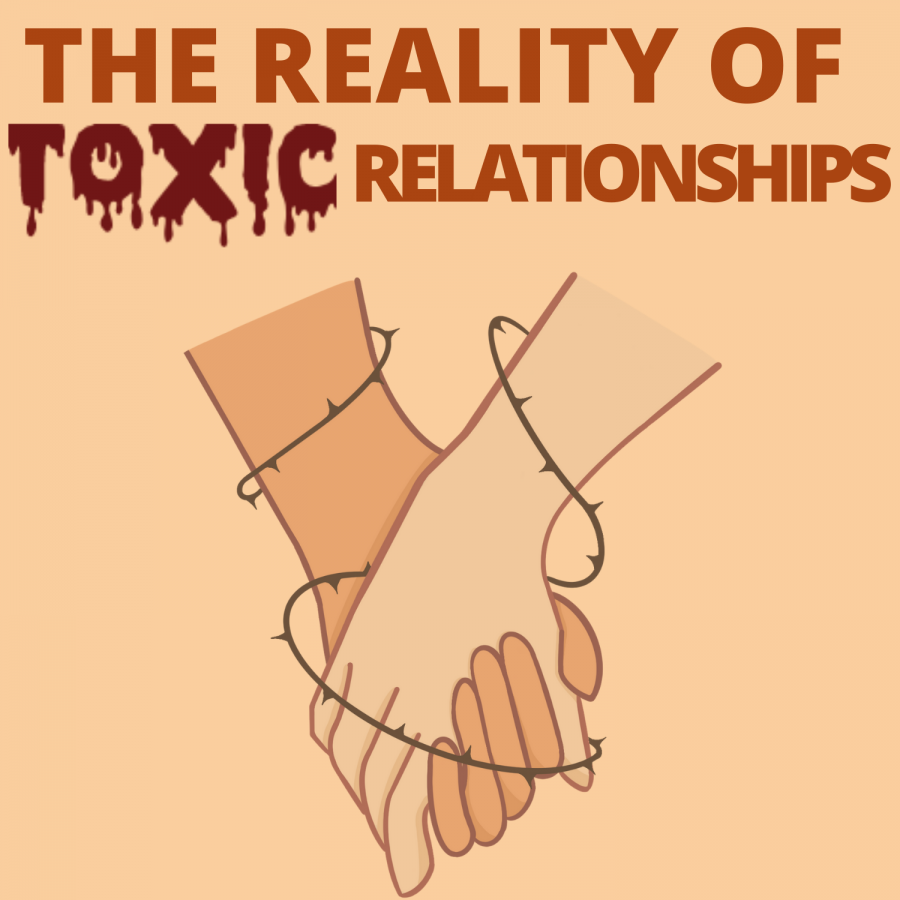The Reality of Toxic Relationships
March 22, 2021
Coming of age in a society saturated by media, many teens today grow to have an unrealistic view of what a relationship should look like, especially in high school. Although some expectations involve the desire for a modern-day love story, they can also include the romanticization of toxic relationships.
According to Psychologist Dr. Lillian Glass, author of the book “Toxic People”, a toxic relationship is “any relationship [between people who] don’t support each other, where there’s conflict and one seeks to undermine the other, and a lack of cohesiveness.”
In a 2017 study published in Psychology Today, over 60 percent of teens stay in unhealthy or toxic relationships. Additionally, in an Instagram poll with over 100 responses from LSE students, roughly 82 percent of participants claimed they had been in a toxic relationship.
But why do teens stay in a relationship that’s toxic?
Many teens, including 2018 LSE graduate Chelsea Bergonia, believe that eventually the relationship will work itself out. “I witnessed unhealthy relationships, which made me believe toxicity was do-able,” Bergonia said.
Popular television shows such as “Euphoria”, “Pretty Little Liars” and “Gossip Girl”, depict young people grappling with toxic relationships. Teenaged viewers could find themselves romanticizing the doomed love stories within these shows, leading them to believe toxic relationships should be sought out and idolized.
According to the article “The Negative Health Effects of a Bad Relationship” published by the University of Southern California (USC) Keck Medicine Program, people stay in toxic relationships due to idealization. The author of the article, Deanna Pai, has written multiple articles for USC and other medical programs regarding medical based issues. Pai stated in that article that “idealization, or the idea of an ideal partner, is rooted in unconscious or subconscious desires influenced by cultural and biological forces.”
Often in toxic relationships there are multiple indications that the person or relationship is toxic, and these types of relationships can have lasting effects on people long after the relationship. Pai writes that “influences basically blind people to the red flags that can be so obvious to friends and family — and, typically, everyone except the person involved.”
Toxic behaviors and warning signs can look different in every relationship, there can be harmful miscommunications and a lack of boundaries.“When you love someone you’ll make excuses for their negative behavior,” Bergonia said. In her experience with a toxic relationship, Bergonia said there was “manipulation, controlling behavior, and perpetual negativity.”
LSE students shared on an Instagram poll that in previous toxic relationships, their significant other’s happiness came before their own, the relationship felt one-sided, and one student reported feeling as though they were walking on eggshells to not upset their significant other.
Bergonia, who reported she was in a toxic relationship during her junior year of high school, came to recognize that a functional relationship takes effort from both people involved.
In addition, senior Izzi Velinsky, an LSE Peer Mediator who works first-hand with students dealing with toxic relationships, says people will blame others for their own issues, which can lead to toxicity and a hostile relationship because they lack the ability to take accountability for their actions.
“A big problem I see is people don’t know how to use ‘I’ statements,’’ Velinsky said.
An “I statement” is a phrase or statement used to express one’s individual feelings without placing blame on the other person involved. Instead of saying “you made me feel upset” the I statement would resemble something like “I felt upset when…”.
Using these statements can allow students to better understand each other’s feelings without feeling blamed. Because peer mediators want to help relationships improve, the use of “I statements” can help those in relationships learn to better communicate their feelings.
Even when teens realize their relationship is toxic they’re often unsure of what to do. “I felt like they were dependent on me, and that I couldn’t leave,” Velinsky said.
The effects of toxic relationships, especially at a young age or in high school, can cause issues while in the relationship and have lasting effects on the person after the relationship has ended.
“What I suffered from caused me to have odd behaviors or reactions to certain stimuli,” Bergonia said. Being forced to deal with such a negative environment can not only cause exhaustion, unhappiness, and self-image issues, but also multiple mental health issues such as depression and anxiety.
In more extreme cases, USC’s article revealed that these effects on the body aren’t just mental, but also cause health issues such as a weakened immune system and even organ damage.
In USC’s article, Pai writes that “a bad relationship is not worth the toll it can have on your body.”
Being constantly told by someone you care about that you hold no value and that your feelings are invalid can do nothing but harm to an individual. “I was told that ‘no one else will love you but me because of your issues’. It broke me apart as an individual and made me feel worthless,” Bergonia said.
Toxic phrases and relationships have grown to become normalized which is part of the reason so many teens find themselves in them. Teens may even begin to invalidate their own feelings, causing the person originally trying to communicate their concerns to worry that they are the one creating issues by not fully trusting their partner. In reality they have every right to have concerns and want to communicate with their partner..
However, these relationships aren’t always one-sided. People in a relationship can be equally toxic to each other. They could mistake love and wanting to be with each other as an excuse to be toxic and control one another.
The reality of toxic relationships is that people will make excuses for toxic behaviors and being treated poorly or being controlled because they care about the person or don’t see their actions as problematic. Teenagers need to ask themselves if these constant cons are worth the rare pros of the relationship.









